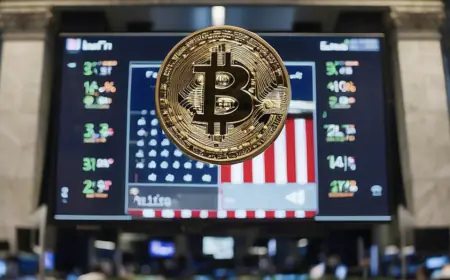The crypto industry’s future suddenly looks so bleak
It’s becoming unmistakably clear that the once bright horizon for the crypto industry now hangs under a cloud of uncertainty. Straddling the forefront of innovation, this sector finds itself entangled in a complex web spun by the very system designed to nurture its growth. The American judicial landscape, typically a bastion of fairness and progress, […]

It’s becoming unmistakably clear that the once bright horizon for the crypto industry now hangs under a cloud of uncertainty. Straddling the forefront of innovation, this sector finds itself entangled in a complex web spun by the very system designed to nurture its growth. The American judicial landscape, typically a bastion of fairness and progress, has inadvertently morphed into a quagmire for an industry thriving on the edge of modern financial and technological paradigms.
The Unsung Heroes of Innovation Meet Their Match
In a twist of fate, the crypto sphere—once celebrated as the cradle of the next internet—now battles for its very existence against an arsenal of regulatory challenges. At the heart of this unfolding drama is a glaring oversight by regulatory bodies like the Securities and Exchange Commission (SEC), which, armed with antiquated tools, aim to tame a beast they scarcely understand. The traditional financial world, built on the back of intermediaries, suddenly finds itself outpaced by a technology that thrives on direct, peer-to-peer transactions, mirroring the simplicity of handing cash to a service provider.
The SEC, with its one-size-fits-all approach, fails to recognize the intrinsic diversity within the crypto ecosystem, lumping wildly differing entities into the same regulatory net. This blunt instrument approach not only stifles innovation but also skirts the real issue at hand: the need for a regulatory framework that evolves in tandem with the technologies it seeks to govern. As the crypto industry ventures into uncharted territories, it finds itself caught in a relentless downpour of lawsuits and enforcement actions, lacking the shelter of clear regulatory guidelines.
The battleground extends beyond mere regulatory skirmishes, touching the very core of constitutional rights and the principles of privacy and freedom. High-profile cases against giants like Binance, Coinbase, and Kraken, alongside the crusades led by the Crypto Freedom Alliance, underscore a fundamental question: can existing legal frameworks accommodate the novel realities of the crypto world?
A Storm on the Horizon: Legislative Turbulence
Amidst this legal labyrinth, the specter of overreach looms large, casting a long shadow over the future of crypto. The legislative arena, far from being a sanctuary of clarity and progress, has turned into a coliseum where the fate of digital assets is contested by gladiators wielding bills like weapons. Senators, under the guise of national security, propose measures that threaten to erode the very foundations of blockchain’s promise—decentralization, anonymity, and freedom from overarching surveillance.
Bills aimed at extending the draconian tendrils of the Bank Secrecy Act to the realm of digital wallets and miners threaten to suffocate innovation under the weight of compliance and surveillance. The pursuit of a safer financial ecosystem, while noble in intent, risks casting a net so wide that it ensnares the engines of progress and creativity.
Imagine, for a moment, a world where the early internet had been shackled by similar constraints, doomed to languish in a quagmire of regulatory oversight and suspicion. The parallels are not merely speculative but serve as a stark warning of the potential consequences of misguided legislative zeal. The crypto community, far from being a monolith, encompasses a vast spectrum of actors, from developers and entrepreneurs to artists and activists, all of whom stand to lose in an environment where innovation is met with suspicion rather than support.
The irony is palpable as the very institutions meant to foster innovation and protect individual rights inch closer to becoming the harbingers of stagnation. The proposed legislation, with its veneer of safeguarding national security, thinly veils an agenda that could derail the crypto industry’s potential for unprecedented economic and technological growth. The zeal to regulate, driven by a fear of the unknown and a desire to control, threatens to stifle the very essence of what makes blockchain technology transformative.
What's Your Reaction?









































































































